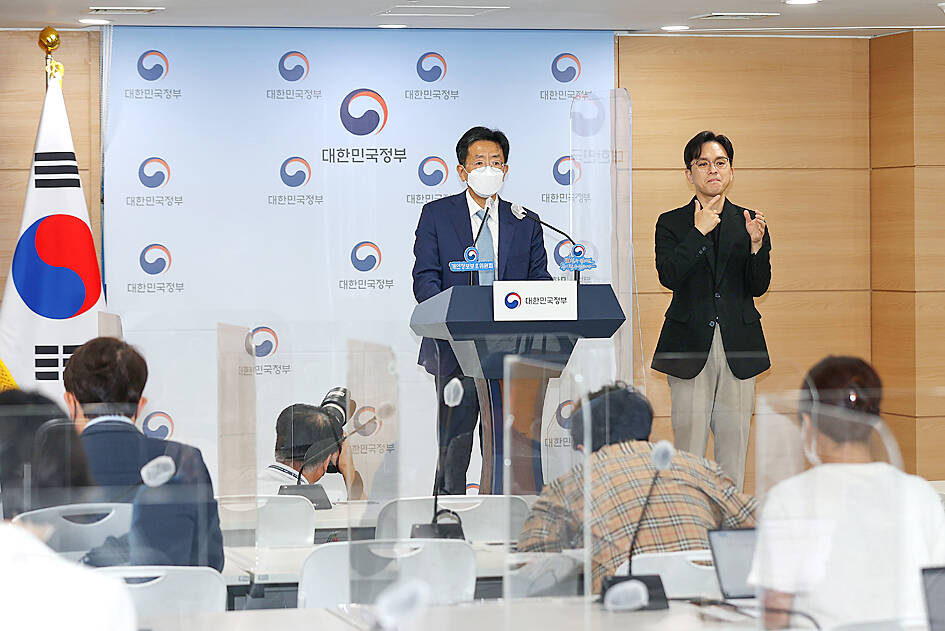South Korea has fined Alphabet Inc’s Google and Meta Platforms Inc more than US$71 million collectively for gathering users’ personal information without consent for tailored ads, regulators said yesterday, the country’s highest-ever data protection fines.
Investigations into the two US technology giants found they had been “collecting and analyzing” data on their users, and monitoring their use of Web sites and applications, the South Korean Personal Information Protection Commission said.
The data was used to “infer the users’ interests or used for customized online advertisements,” the commission said.

Photo: EPA-EFE
Neither Google nor Meta had clearly informed South Korean users of this practice or obtained their consent in advance, the commission added.
As a result, Google was fined 69.2 billion won (US$49.7 million) and Meta 30.8 billion won.
“It is the largest fine for the violation of the Personal Information Protection Act,” the commission said in a statement.
Regulators said that the majority of the users in South Korea — 82 percent for Google and 98 percent for Meta — had unknowingly allowed them to collect data on their online use.
“It can be said that the possibility and the risk of infringement of the rights of the users are high,” the statement said.
Last year, South Korea fined Google nearly US$180 million for abusing its dominance in the mobile operating systems and app markets, saying it was hampering market competition.
Google did not have an immediate comment.
“While we respect the commission’s decision, we are confident that we work with our clients in a legally compliant way that meets the processes required by local regulations,” a Meta spokesperson said.
“As such, we do not agree with the commission’s decision and will be open to all options including seeking a ruling from the court,” the spokesperson added.
Giant US tech companies are regularly criticized for dominating markets by elbowing out rivals, with multiple governments globally seeking to rein them in.
The EU has slammed Google with record antitrust penalties, and also gone after Apple Inc and Microsoft Corp.
Additional reporting by Reuters

South Korea’s equity benchmark yesterday crossed a new milestone just a month after surpassing the once-unthinkable 5,000 mark as surging global memory demand powers the country’s biggest chipmakers. The KOSPI advanced as much as 2.6 percent to a record 6,123, with Samsung Electronics Co and SK Hynix Inc each gaining more than 2 percent. With the benchmark now up 45 percent this year, South Korea’s stock market capitalization has also moved past France’s, following last month’s overtaking of Germany’s. Long overlooked by foreign funds, despite being undervalued, South Korean stocks have now emerged as clear winners in the global market. The so-called “artificial intelligence

NEW IDENTITY: Known for its software, India has expanded into hardware, with its semiconductor industry growing from US$38bn in 2023 to US$45bn to US$50bn India on Saturday inaugurated its first semiconductor assembly and test facility, a milestone in the government’s push to reduce dependence on foreign chipmakers and stake a claim in a sector dominated by China. Indian Prime Minister Narendra Modi opened US firm Micron Technology Inc’s semiconductor assembly, test and packaging unit in his home state of Gujarat, hailing the “dawn of a new era” for India’s technology ambitions. “When young Indians look back in the future, they will see this decade as the turning point in our tech future,” Modi told the event, which was broadcast on his YouTube channel. The plant would convert

‘SEISMIC SHIFT’: The researcher forecast there would be about 1.1 billion mobile shipments this year, down from 1.26 billion the prior year and erasing years of gains The global smartphone market is expected to contract 12.9 percent this year due to the unprecedented memorychip shortage, marking “a crisis like no other,” researcher International Data Corp (IDC) said. The new forecast, a dramatic revision down from earlier estimates, gives the latest accounting of the ongoing memory crunch that is affecting every corner of the electronics industry. The demand for advanced memory to power artificial intelligence (AI) tasks has drained global supply until well into next year and jeopardizes the business model of many smartphone makers. IDC forecast about 1.1 billion mobile shipments this year, down from 1.26 billion the prior

People stand in a Pokemon store in Tokyo on Thursday. One of the world highest-grossing franchises is celebrated its 30th anniversary yesterday.